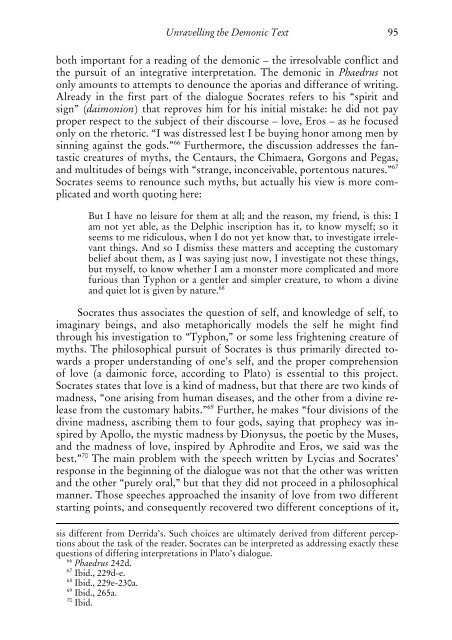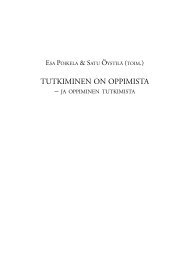Note on this edition: this is an electronic version of the 1999 book ...
Note on this edition: this is an electronic version of the 1999 book ...
Note on this edition: this is an electronic version of the 1999 book ...
Create successful ePaper yourself
Turn your PDF publications into a flip-book with our unique Google optimized e-Paper software.
Unravelling <strong>the</strong> Dem<strong>on</strong>ic Text 95both import<strong>an</strong>t for a reading <strong>of</strong> <strong>the</strong> dem<strong>on</strong>ic – <strong>the</strong> irresolvable c<strong>on</strong>flict <strong>an</strong>d<strong>the</strong> pursuit <strong>of</strong> <strong>an</strong> integrative interpretati<strong>on</strong>. The dem<strong>on</strong>ic in Phaedrus not<strong>on</strong>ly amounts to attempts to denounce <strong>the</strong> aporias <strong>an</strong>d differ<strong>an</strong>ce <strong>of</strong> writing.Already in <strong>the</strong> first part <strong>of</strong> <strong>the</strong> dialogue Socrates refers to h<strong>is</strong> “spirit <strong>an</strong>dsign” (daim<strong>on</strong>i<strong>on</strong>) that reproves him for h<strong>is</strong> initial m<strong>is</strong>take: he did not payproper respect to <strong>the</strong> subject <strong>of</strong> <strong>the</strong>ir d<strong>is</strong>course – love, Eros – as he focused<strong>on</strong>ly <strong>on</strong> <strong>the</strong> rhetoric. “I was d<strong>is</strong>tressed lest I be buying h<strong>on</strong>or am<strong>on</strong>g men bysinning against <strong>the</strong> gods.” 66 Fur<strong>the</strong>rmore, <strong>the</strong> d<strong>is</strong>cussi<strong>on</strong> addresses <strong>the</strong> f<strong>an</strong>tasticcreatures <strong>of</strong> myths, <strong>the</strong> Centaurs, <strong>the</strong> Chimaera, Gorg<strong>on</strong>s <strong>an</strong>d Pegas,<strong>an</strong>d multitudes <strong>of</strong> beings with “str<strong>an</strong>ge, inc<strong>on</strong>ceivable, portentous natures.” 67Socrates seems to renounce such myths, but actually h<strong>is</strong> view <strong>is</strong> more complicated<strong>an</strong>d worth quoting here:But I have no le<strong>is</strong>ure for <strong>the</strong>m at all; <strong>an</strong>d <strong>the</strong> reas<strong>on</strong>, my friend, <strong>is</strong> <strong>th<strong>is</strong></strong>: Iam not yet able, as <strong>the</strong> Delphic inscripti<strong>on</strong> has it, to know myself; so itseems to me ridiculous, when I do not yet know that, to investigate irrelev<strong>an</strong>tthings. And so I d<strong>is</strong>m<strong>is</strong>s <strong>the</strong>se matters <strong>an</strong>d accepting <strong>the</strong> customarybelief about <strong>the</strong>m, as I was saying just now, I investigate not <strong>the</strong>se things,but myself, to know whe<strong>the</strong>r I am a m<strong>on</strong>ster more complicated <strong>an</strong>d morefurious th<strong>an</strong> Typh<strong>on</strong> or a gentler <strong>an</strong>d simpler creature, to whom a divine<strong>an</strong>d quiet lot <strong>is</strong> given by nature. 68Socrates thus associates <strong>the</strong> questi<strong>on</strong> <strong>of</strong> self, <strong>an</strong>d knowledge <strong>of</strong> self, toimaginary beings, <strong>an</strong>d also metaphorically models <strong>the</strong> self he might findthrough h<strong>is</strong> investigati<strong>on</strong> to “Typh<strong>on</strong>,” or some less frightening creature <strong>of</strong>myths. The philosophical pursuit <strong>of</strong> Socrates <strong>is</strong> thus primarily directed towardsa proper underst<strong>an</strong>ding <strong>of</strong> <strong>on</strong>e’s self, <strong>an</strong>d <strong>the</strong> proper comprehensi<strong>on</strong><strong>of</strong> love (a daim<strong>on</strong>ic force, according to Plato) <strong>is</strong> essential to <strong>th<strong>is</strong></strong> project.Socrates states that love <strong>is</strong> a kind <strong>of</strong> madness, but that <strong>the</strong>re are two kinds <strong>of</strong>madness, “<strong>on</strong>e ar<strong>is</strong>ing from hum<strong>an</strong> d<strong>is</strong>eases, <strong>an</strong>d <strong>the</strong> o<strong>the</strong>r from a divine releasefrom <strong>the</strong> customary habits.” 69 Fur<strong>the</strong>r, he makes “four div<strong>is</strong>i<strong>on</strong>s <strong>of</strong> <strong>the</strong>divine madness, ascribing <strong>the</strong>m to four gods, saying that prophecy was inspiredby Apollo, <strong>the</strong> mystic madness by Di<strong>on</strong>ysus, <strong>the</strong> poetic by <strong>the</strong> Muses,<strong>an</strong>d <strong>the</strong> madness <strong>of</strong> love, inspired by Aphrodite <strong>an</strong>d Eros, we said was <strong>the</strong>best.” 70 The main problem with <strong>the</strong> speech written by Lycias <strong>an</strong>d Socrates’resp<strong>on</strong>se in <strong>the</strong> beginning <strong>of</strong> <strong>the</strong> dialogue was not that <strong>the</strong> o<strong>the</strong>r was written<strong>an</strong>d <strong>the</strong> o<strong>the</strong>r “purely oral,” but that <strong>the</strong>y did not proceed in a philosophicalm<strong>an</strong>ner. Those speeches approached <strong>the</strong> ins<strong>an</strong>ity <strong>of</strong> love from two differentstarting points, <strong>an</strong>d c<strong>on</strong>sequently recovered two different c<strong>on</strong>cepti<strong>on</strong>s <strong>of</strong> it,s<strong>is</strong> different from Derrida’s. Such choices are ultimately derived from different percepti<strong>on</strong>sabout <strong>the</strong> task <strong>of</strong> <strong>the</strong> reader. Socrates c<strong>an</strong> be interpreted as addressing exactly <strong>the</strong>sequesti<strong>on</strong>s <strong>of</strong> differing interpretati<strong>on</strong>s in Plato’s dialogue.66 Phaedrus 242d.67 Ibid., 229d-e.68Ibid., 229e-230a.69 Ibid., 265a.70Ibid.














